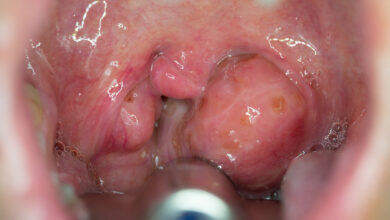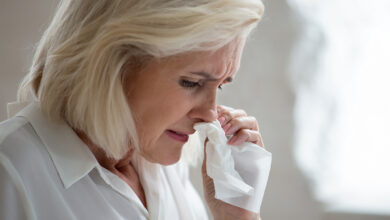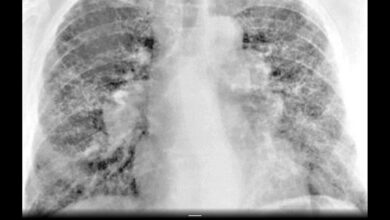WHAT’S A CANKER SORE?

Annoying. Painful. Disgusting. Aggravating. These are just some of the descriptions applied to Canker Sores. Nearly everyone has had one; if not on the inside of the lip, then on the tongue or throat. That painful open ulcer-like place in your throat that hurts like heck when you swallow; that yellow, sensitive spot on the side of your tongue or inside of your lip that burns like crazy. These are examples of those irritating spots called by various names, but commonly known as Canker Sores. The fancy name is Aphthous Ulcers.
Unlike cold sores, canker sores are not infectious or contagious and occur only inside of the mouth. Overwhelmingly, canker sores are caused by trauma or injury to the lining of the mouth, throat, or tongue by whatever means. A jagged tooth edge, biting the tongue or inside of the cheek, toothbrush abrasion, and poor-fitting dentures or dental appliances are just some mechanisms. But whatever it is that makes them become inflamed and painful is really not known. Poor oral hygiene and transferring irritative agents from the hands to the mouth are probably contributing factors.
Stress, acidic fruits and vegetables (lemons, strawberries, oranges, tomatoes, apples), NSAID drugs (ibuprofen), vitamin deficiencies (B-12, folic acid, zinc, iron), auto-immune disorders (Lupus, Behçet’s disease), and gastrointestinal diseases (Crohn’s, Ulcerative colitis, Celiac Disease) are also proven causes.
Since you may have had a canker sore, you’re well aware they are small (1-10 mm) white or yellow plaques that open and ulcerate causing pain, burning, and stinging when bathed by certain irritating foods, are abraded by your toothbrush, or scraped by a large bite of under- chewed food. They usually last a few days but can persist for 2-4 weeks. During this time, the symptoms all continue making eating and/or talking difficult and uncomfortable. In severe cases, fever and flu-like symptoms can occur.
The best treatment for canker sores is prevention. Good oral hygiene, careful hand washing, avoidance of putting your fingers in your mouth, avoiding causative foods and drugs, and chewing, biting, and brushing with care and caution are important preventive measures.
If you get a canker sore or two, you must be patient. They will go away, but it may take a week or two. There isn’t a magical cure. Topical gels (Oragel), pastes (Paroex, Periogard, Peridex), or liquids (milk of magnesia, corticosteroids) all help to ease the pain but are not curative. Vigorous mouth care with mouthwashes and gargles help symptomatically as well, but time and patience are needed most. In the past, I occasionally prescribed anti-herpes simplex/zoster drugs for canker sores, but there is no justification to do so because canker sores are not caused by herpes. Cold sores on the lip or around the nose are different, however, and are helped by such drugs (Valtrex, Zovirax, Famvir).
Dr. G’s Opinion: Canker sores are a minor nuisance that at times can be very troublesome. Patience, hand-washing, and good oral hygiene are important factors for faster resolution of these lesions. I have personally correlated canker sores I’ve had directly to inadequate cleaning of my CPAP equipment. Since purchasing a cleaning system, the occurrence of canker sores has ceased completely. There are dozens of similar scenarios that tend to make our lives uncomfortable. Recognizing them and taking corrective, preventive action will make life more pleasant.
References: https://www.wedmd.com/oral-health/guide/canker-sores
https://www.mayoclinic.org/diseases-conditions/canker-sore/symptoms-causes
https://www.clevelandclinic.org/health/diseases–canker-sores
Staines, K, Greenwood M. Aphthous Ulcers-Recurrent BMJ Clin Evid 2015 Feb 26;2015:1303.




